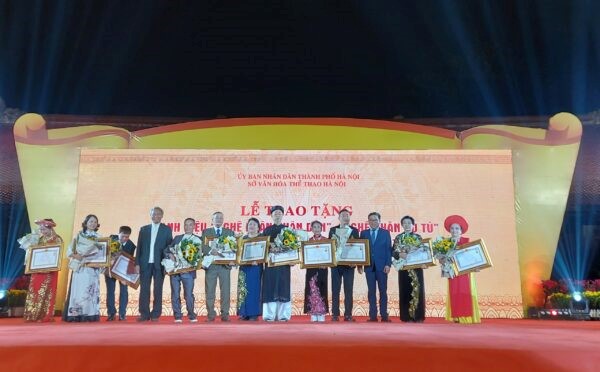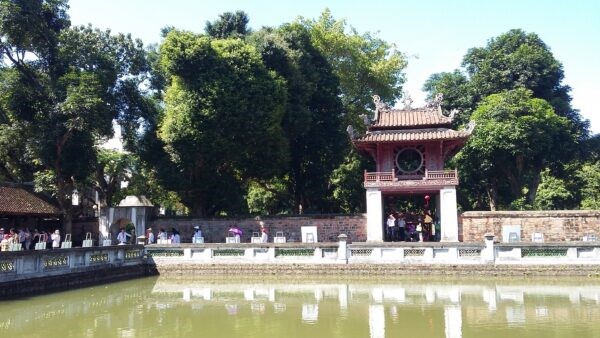Preserving and leveraging the values of cultural heritage to drive the development of the cultural industry in the current phase is a responsibility shared across the entire political system, at all levels, and among various sectors – a commitment rooted in the belief that “investing in culture is an investment in sustainable development.”
The conservation of heritage and the development of culture are focal points that Hanoi consistently prioritizes, evident in numerous resolutions and programs. Notably, Program No. 06-CTr/TU from the Municipal Party Committee outlines the “Development of culture, enhancement of the quality of human resources, and the cultivation of elegant and civilized Hanoians in the period 2021-2025.” Similarly, Resolution No. 09-NQ/TU of the Hanoi City Party Committee focuses on the “Development of the cultural industry in the capital city during the period 2021-2025, with an orientation toward 2030 and a vision toward 2045.”
Hanoi currently boasts 5,922 documented heritage sites (including 1 world cultural heritage, 21 clusters of special national monuments, 1,160 national monuments, and 1,456 city-level monuments), along with over 1,700 intangible cultural heritage items identified, cataloged, and enlisted for protection. Possessing this wealth of heritage, Hanoi has implemented various measures to preserve and enhance the value of these cultural treasures.

Hanoi excels in preserving and promoting the intangible cultural heritage of Ca Tru.
Hanoi has undertaken substantial legal and operational directives concerning the preservation and promotion of the values of its intangible cultural heritage, specifically Ca Tru, a unique form of ceremonial singing. Hanoi stands as one of the pioneering localities nationwide in completing the comprehensive inventory of monuments and intangible cultural heritage. In 2016, the city accomplished the project “General Inventory and Protection of Hanoi’s Intangible Cultural Heritage for the 2014-2016 period.” This initiative identified the types of heritage that needed prioritized protection, especially those facing the risk of deterioration. Building upon the results of the inventory of intangible cultural heritage, the city has launched activities to support the teaching and transmission of cultural heritage in various localities. This effort aims to broaden the audience actively engaged in heritage practices, enhance awareness, foster responsibility for preservation, and unleash the value of heritage within the community. Additionally, it involves educating secondary school students on intangible cultural heritage. To mobilize both the community and the political system to participate in preserving and promoting the value of heritage, on February 18, 2022, the People’s Committee of Hanoi issued Plan No. 55/KH-UBND on the conservation and promotion of the value of the city’s intangible cultural heritage until 2025, outlining annual tasks and focal points for each year. Decision No. 41/2016/QD-UBND, dated September 19, 2016, by the People’s Committee of Hanoi, established clear regulations on the decentralized management of certain areas of infrastructure and socio-economic affairs within the city. It explicitly defined the city’s direct management of 10 exemplary cultural monuments and decentralized management of the remaining cultural monuments to districts, towns, and suburban districts. The decision also allocated the city budget for investment in special national monuments, and revolutionary monuments, and provided partial financial support for the restoration, preservation, and promotion of the value of national monuments managed by the district level.

Hanoi bestows Titles of People’s Artisan and Meritorious Artisan – honoring custodians and practitioners of intangible cultural heritage.
Since 2012, Hanoi has implemented an educational approach to cultural heritage through various forms targeting diverse audiences. Through exploratory journeys into heritage, featuring engaging and diverse activities at iconic sites like the Temple of Literature and the Hoa Lo Prison historical site, the city has built a brand, increasing its allure for tourists.
Over the years, Hanoi has undertaken the digitization of its cultural heritage, contributing to the preservation of valuable documents and images. This initiative has established a common data system for monuments and landmarks, including iconic red-addressed sites within the city. Simultaneously, it has enhanced the understanding and appreciation of the traditional culture of the capital among both domestic and international audiences.
In tandem with these efforts, the documentation of intangible cultural heritage and the recognition of its custodians have gained increasing attention and emphasis. Presently, the city boasts five entries listed by the United Nations Educational, Scientific, and Cultural Organization (UNESCO) under various categories, 26 entries in the National Intangible Cultural Heritage list, and a total of 18 People’s Artisans and 113 Meritorious Artisans.

Temple of Literature – Quoc Tu Giam: A destination for many domestic and international tourists.
Preserving and promoting the value of cultural heritage is a current responsibility for the entire political system, at all levels and sectors, reflecting the spirit of “investing in culture is investing in sustainable development.” Therefore, in the coming period, Hanoi continues to propose effective solutions for managing, preserving, and promoting the value of both tangible and intangible cultural heritage, ensuring a harmonious relationship between preservation and development. The city will implement policies to recognize and reward folk artisans and artists and encourage the transmission and creation of new cultural values. Attention will be given to addressing violations in the management and preservation of cultural heritage. Training and enhancing the capacity of the city’s cultural heritage and tourism management apparatus will be prioritized to create the most favorable conditions for the development of the cultural and creative industries – areas where Hanoi holds significant advantages and potential compared to other regions in the country. There will be increased public awareness campaigns, ensuring that people understand the role of heritage in cultural industries, comprehending their responsibilities and rights in participating in conservation efforts and unlocking the value of heritage.

